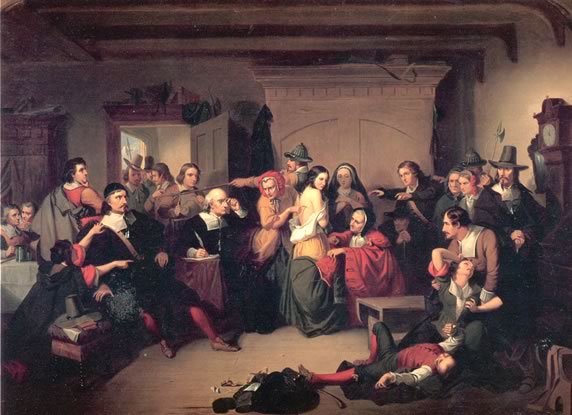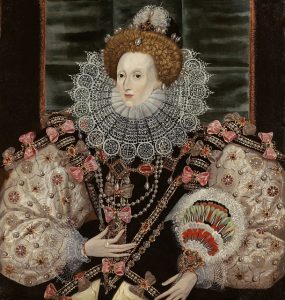Why would adults in Salem, Massachusetts in the 1690s take the accusations of nine year old girls seriously? During the seventeenth century, New England had grown diverse. The people living in the communities were of different backgrounds. But in the 1690’s there was an apparent outbreak of witchcraft. The most famous of these outbreaks was the event in Salem, Massachusetts in 1692 that stirred up the Salem community and soon spread to other communities.
The widespread hysteria over witches was all over the town after an accusation of witchcraft was made in January 1692. A group of young adolescent girls met in the home of Samuel Parris, a Puritan pastor in Salem. The pastor had a nine year old daughter, Betty. Betty and her cousin Abigail were fascinated by the voodoo tales and tricks told to them by the family slave. The family slave, Tituba, was the one whom the little girls had sought after for entertainment.1 It was not long after their time spent with Tituba, when the girls began to behave strangely; seeing visions, babbling at times, and lapsing into trances. The Puritans thought that these behaviors were of witchcraft, as the work of the devil. People in Salem began believing the girls, and charged Tituba and two other village women for practicing witchcraft on them. Two men, John Hathorne and Johnathan Corwin of Massachusetts, were called to do a legal examination of the women. The Puritans followed the Old Testament law. This was how they assessed the examinations. Scripture had a statement that said witches were not able to live. The two men knew exactly what they had to do. The examination was done on these women of Salem by looking for a certain mark on the body: a wart or tit. This specific mark was said to be the place where the devil and his demons would take blood out of the witch.2 Many of the women accused were of lower status in the community.

Research shows most of the accused witches were middle-aged women, widowed, with few or no children. Also, if the woman had been involved with domestic conflicts, they were accused. The women were accused of crimes and appeared to be dangerous by their neighbors. Women in Salem who inherited or possessed land were also accused of witchcraft.3 The accusations towards these women were out of the ordinary and seemingly wrong. One must first think about the view of women during this time. They were undermined and portrayed as having no power or knowledge of such things; they were subservient to the men in the community. Not only were low class women accused of witchcraft, but as time passed, superior women were accused as well.4
On October 29th, the Salem Witch Trials were called to an end. Governor Phips dismissed the Court and that marked the end to the witch hunt craze. Many were disappointed about the ending of the trials, but many were glad to return to work.5 The community in Salem blamed Pastor Parris for letting the innocent die. The people of the Salem church also voted to void his salary. In the following years, those family members of the deceased were restored their good names. The families were awarded a compensation for all the financial loses they went through during such tragic times. Increase Mather, a pastor of the Boston Puritan Church, wanted the people to do away with the court because he believed they put innocent people to death.
The Witch trials took on an important role in American History. The trials became a tragic and memorable moment in history. Generational, racial, and sexual hostility, opposition to law, social stresses, and food poisoning were all causes as to why the people had anxieties that found release in the witch hunt craze. The witch hunts became searches for scapegoats; the community leaders were looking for anyway possible to ease the community’s anxieties.6
- Kenneth P. Minkema, “In the Devil’s Snare: The Salem Witchcraft Crisis of 1692,” The Christian Century, no. 8 (2003): 37. ↵
- Salem Press Encyclopedia, January 2015, s.v. “Salem Witchcraft Trials,” by Warren M. Billings and Kimberly Manning. ↵
- Alan Brinkley, American History, 15th ed., vol. 1: to 1865 (2 Penn Plaza, New York, NY 10121: McGraw Hill Education, 2015), 86-87. ↵
- Salem Press Encyclopedia, January 2015 s.v. “Salem Witchcraft Trials,” by Warren M. Billings, Kimberly Manning. ↵
- Salem Press Encyclopedia, January 2015 s.v. “Salem Witchcraft Trials,” by Warren M. Billings, Kimberly Manning. ↵
- Salem Press Encyclopedia, January 2015 s.v. “Salem Witchcraft Trials,” by Warren M. Billings and Kimberly Manning. ↵



178 comments
Vianey Centeno
It is extremely unfortunate to see how many innocent women were executed during the Salem witch trials, and this piece was excellent. It exemplifies how far women’s rights have progressed since North America was colonized. Despite how gloomy this period in history is, it should serve as a reminder to be cautious when making accusations. I appreciate you writing this.
Kayla Braxton-Young
This is a very interesting article. There has been a lot of information that I haven’t considered before. Thus, I have gained many new insights into this topic. I know that Hocus Pocus is a major topic, especially in these recent times. Many individuals tend to fully commit to the white-spread conception that Hocus Pocus will affect their life in a positive way. I really enjoyed reading this article because me personally, I haven’t watched Hocus Pocus.
Eugenio Gonzalez
The author briefly introduces how witchcraft started to increase in Salem, Massachusetts. A nine-year-old daughter of a pastor began to have a pattern of weird behavior. People started to accuse the family enslaved person for the odd behavior of the girl. The Community used the old testament law to determine the verdict of the enslaved person. After this case, many women started to be convicted of witchcraft, but the accusations were false in most cases. After some time, things got out of hand, so the governor of Massachusetts decided to end the witch hunt.
The reading took place in a time when women were not treated fairly.
After reading the article and learning in class, we can understand how New England society acted. During those times, society considered women inferior and incapable of handling complex situations. Therefore they were easier targets for blackmail, and many were unfairly accused of witchcraft. This topic can connect the class when discussing the colonies and their cultures.
I think writing about the Salem Witch trials is important because it helps people find accurate information about this event and not be misled by other types of articles. The author does an incredible job of introducing us to the topic. Another thing that the author did an excellent job at was in making the event come to life. I also liked the image the author used; it helped me have an idea of what the trials looked like and gave life to the article.
Brandon Vasquez
This article was well written and allows the reader to understand the Salem Witch Trials and how this event started. I think asking the question “Why would adults in Salem, Massachusetts in the 1690s take the accusations of nine-year-old girls seriously?” makes the reader wonder what could possibly be happening that grown adults would believe something that a young child thinks. I also like how the ending of these trials is included at the end of this article.
Gabriela Chavarria
This article was very well written and shows how many crazy ideas and accusations that were going on during this time it’s crazy to think that they believed that if someone had any time of mole or wart or other type of mark on them they’d be accused of being a witch no matter what there status was in society.
Ryan Romine
This was a fascinating article. I think it is crazy how people fell into these crazy stories about people practicing witchcraft. I think people just started accusing people that they didn’t like to get them as a target for the community. It would have been interesting to see how long this could have continued before something really crazy happened like the whole town was burned down to get ride of all the evil.
Brandon Vasquez
This article was well written and allows the reader to understand the Salem Witch Trials and how this event started. I think asking the question “Why would adults in Salem, Massachusetts in the 1690s take the accusations of nine-year-old girls seriously?” makes the reader wonder what could possibly be happening that grown adults would believe something that a young child thinks. I also like how the ending of these trials is included in the end of this article.
Elena Montiel
I have always found the Salem Witch Trials fascinating so I enjoyed how the article broke down the timeline from beginning to end. It was well written, and I am glad to see that you put the different reasons women were targeted and put at risk for being put on trial. I also found it interesting how you put ht impact on the community as a whole and not only those targeted.
Emily Davey
The Salem trials are a mystery to me, and I may never understand in full why so many women were targeted, and why witchcraft was the charge of choice. I feel pity for the women who were blamed, and the story of Tituba and her tragic death was incredibly interesting to read. I wonder why the word of children was taken so heavily- was it because of the fear of witches already prevalent in the community, or because the lawmakers were already looking for any reason to get rid of women they did not approve of? This article shed some more light on the causes and conclusion of the trials, it was wonderfully informative and I liked the use of pictures!
Rigel
Interesting article! I have heard about the Salem Witch Trials before, and I knew some things from it, so this was a much needed refresher for my memory. Love the way you organized your article and how informative it is! Quite interesting and sad that the judges would sacrifice the lives of innocent women just to prove that they are inferior to men.